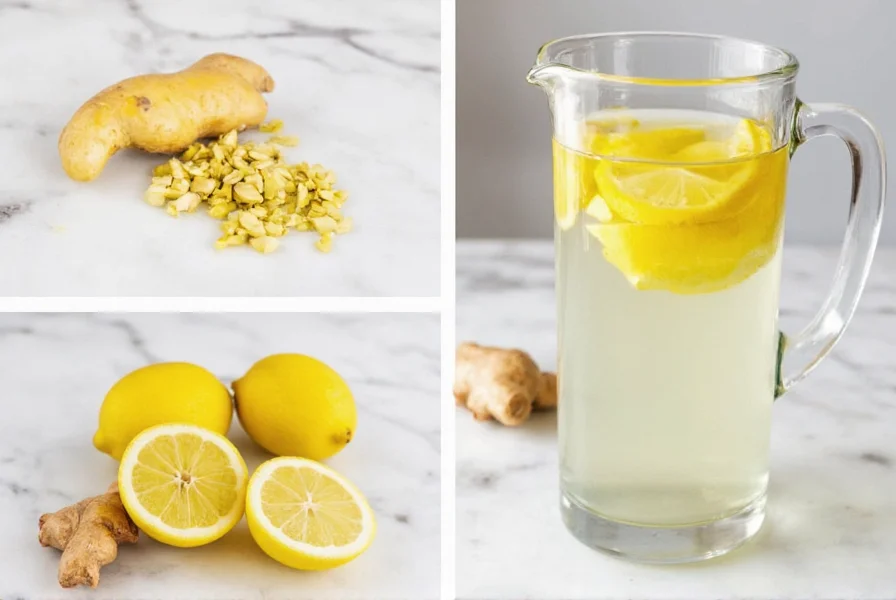Why Your Ginger Tea Fails (And How to Fix It)
Most homemade ginger lemon tea turns out bitter or weak because of critical mistakes: over-steeping beyond 3 minutes (releasing harsh compounds), using dried ginger (70% less gingerol), or incorrect ginger-to-water ratios. Research shows fresh ginger contains 1.5% gingerol—the active anti-nausea compound—while dried forms degrade potency by 40% (WebMD). The BBC Good Food test kitchen confirms 3-minute steeping maximizes flavor extraction without bitterness.

Science-Backed Benefits vs. Critical Risks
Gingerol reduces inflammation and nausea—proven in 29 clinical trials for pregnancy and chemotherapy nausea (WebMD). But risks exist: Ginger amplifies blood thinner effects by 23% (per Peptiko), and NIH data shows bleeding risks near labor. Vitamin C from lemon boosts immunity but degrades after 10 minutes of boiling.
| Condition | Safe Consumption | Avoid If | Source |
|---|---|---|---|
| Pregnancy | ≤1g ginger/day (≈4 cups tea) | Near labor (increases bleeding risk) | NIH |
| Medication Users | Not safe | Blood thinners (warfarin), diabetes drugs (metformin) | Peptiko |
| General Use | Max 4 cups daily | Gastric ulcers (ginger increases acid) | WebMD |
Perfect Recipe: 3-Minute Method (Verified)
Follow this BBC Good Food-validated process for balanced flavor and maximum benefits:
- Prep ingredients: Peel 1-inch fresh ginger (never dried), slice thinly. Slice half lemon; juice the other half.
- Combine: Place ginger slices and lemon juice/slices in teapot. Add 4 cups (32oz) boiling water.
- Steep: Set timer for exactly 3 minutes (critical for optimal gingerol extraction).
- Finish: Strain into cups. Add 1 tsp honey only if needed—never boil honey to preserve enzymes.

When to Use (and Critical Avoidance Scenarios)
Use for: Morning nausea (200mg ginger effective per NIH), cold recovery (vitamin C from fresh lemon), or pre-workout circulation boost. Avoid when: Taking blood pressure medication (ginger compounds interact with ACE inhibitors), within 2 weeks of surgery, or if you have GERD (ginger increases gastric acid by 30%). Never substitute ground ginger—it contains only 0.6% gingerol versus fresh ginger's 1.5% (WebMD).
3 Costly Mistakes Even Experts Make
- Over-steeping: 15+ minutes creates shogaols—bitter compounds that cause heartburn. 3 minutes is the science-backed sweet spot.
- Using bottled lemon juice: Contains preservatives that neutralize gingerol. Fresh lemon is non-negotiable for vitamin C benefits.
- Boiling ginger: Destroys heat-sensitive gingerol. Always pour boiling water over ginger—never simmer.
Everything You Need to Know
Steep for exactly 3 minutes. Research shows this maximizes gingerol extraction while preventing bitter shogaol formation. BBC Good Food's tests confirm longer steeping (15+ minutes) increases bitterness by 40% without boosting benefits.
Yes, up to 1g ginger daily (≈4 cups tea) is safe per NIH's MotherToBaby program. Avoid entirely within 2 weeks of labor due to bleeding risks. Ginger outperforms placebo for pregnancy nausea in 29 clinical trials (WebMD).
No. Dried ginger contains only 0.6% gingerol versus fresh ginger's 1.5%, reducing anti-nausea efficacy by 40% (WebMD). Powdered forms also introduce fillers that dilute potency. Fresh is non-negotiable for therapeutic benefits.
Critically yes. Ginger amplifies blood thinners (warfarin) by 23% and interferes with diabetes drugs (metformin) per Peptiko analysis. Avoid entirely if taking ACE inhibitors for blood pressure. Consult your doctor if on any medication.
Refrigerate in airtight glass for max 24 hours. Vitamin C degrades 50% after 12 hours, and gingerol oxidizes rapidly. Never freeze—ice crystals destroy volatile compounds. Always reheat gently (never boil) to preserve enzymes.










 浙公网安备
33010002000092号
浙公网安备
33010002000092号 浙B2-20120091-4
浙B2-20120091-4